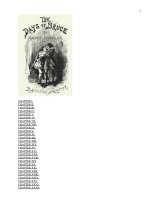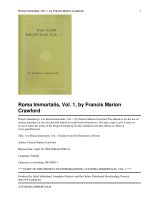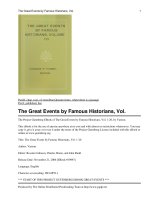The greek anthology vol 1, books i VI
Bạn đang xem bản rút gọn của tài liệu. Xem và tải ngay bản đầy đủ của tài liệu tại đây (21.01 MB, 528 trang )
THE LOEB CLASSICAL LIHUARY
EDITED ny
B.
I
LAPPS, Pu.D., LL.D.
T. B.
PAGE,
LiiT.U.
W.
II.
D.
HOUSE,
THE GREEK ANTHOLOGY
I
LiiT.D.
THE (iREEK ANTHOLOGY.
Volume
II.
SEPULCHRAL EPIGRAMS.
THE EPIGRAMS OF SAIXT GREGORY THE
_
THEOLOGIAN.
Volume
III.
THE DECLAMATORY EPIGRAMS.
VOLUMK
THE
HORTATORY
IV.
AND
EPIGRAMS.
THE CONVIVIAL AND
GRAMS.
ADMONITORY
SATIRICAL
EPI-
STRATO'S MUSA PUERILIS.
Volume
V.
EPIGRAMS IN VARIOUS METRES.
ARITHMETICAL PROBLEMS,
RIDDLES,
ORACLES.
MISCELLANEA.
EPIGRAMS OF THE PLANUDEAN ANTHOLOGY NOT IN THE PALATINE MANUSCRIPT.
//^y/t>/A
'-
^
^
THE GREEK
ANTHOLOGY
WITH AN ENGLISH TRANSLATION BY
W.
R.
IN FIVE
PATON
VOLUMES
I
LONDON
:
NEW YORK
WILLIAM HEINEMANN
G. P. PUTNAM S SONS
:
MCMXX
5 4-S^
-.
V
First printed 1916.
Puprinted 1920.
PREFACE
The
drew
the Stephanus, or Wreath, of
(1)
:
the beginning of the
Meleager, collected in
century
b.c.
by
all
that
no poems
except his own.^
to
own
classical
age,
far as
(as
and
pferiod of
b.c.^
i.e.
Greek
his collection
we know)
It consists of
centuries
third
most worthy of preserva-
is
Meleager was a quite unique
tion in these pages.
personality in his
Augustus.
The
spirit of
Italy,
com-
of that age,
poems of the seventh
of
all
literature.
phanus of Philippus, made probably
descended on
first
master of the elegiac epigram
this
and comprising
]irises
He
Cephalas.
from three older Anthologies of widely
date
different
is
Heidelberg, was composed in
century by Constantine
chiefly
it
unique manuscript of the
the
Library at
Palatine
the tenth
because
Antliology, so called
Palatine
contained only in
the
(2)
great
The
or
Ste-
in the reign of
poesy had in the interval
rather than
on Greece, and
Roman poets, such as Crinagoras of
Mytilene, arc those who please the most.
(3) The
Cycle of Agathias, made in the age of Justinian and
here the most
comprising strictly contemporary work.
^
Antipater of Sidon
is
however
Tlicre
his coiitemporary.
is
PREFACE
inucli
tenderness and beauty in
many
of the poems,
but the writers wrote in a language which they did
not command, but by which they were commanded,
as all
who
try to write ancient
Greek
are.
Cephalas included also in addition to the poems
drawn from these main sources
:
(1) a certain
number
of epigrams derived from well-known authors and a
few copied from stones
;
(2) the Miisa
Puerilis of
Strato (Book XII), a collection on a special subject
made
at
an uncertain date ^
;
(3) a collection of
Love
poems largely by Rufinus (beginning of Book V)
(1)
the epigrams of the Alexandrian Palladas
century
Book
V
a.d.).^
At the beginning
onwards)
I try to indicate
due to each source.
what
is
certainly
In Book IV will be found the
proems of the three chief sources that
above.
(fifth
of each book (from
I
mention
Books I-III explain themselves.
In the twelfth or thirteenth
of astounding industry,
century, a
Maximus Planudes,
scholar
to
whom
learning owes a heavy debt, rearranged and revised
the work of Cephalas and to him alone
we owe
1 For the
sources of tliis book and also of the satirical
epigrams of Book XI see the special prefaces to these
books.
.Some at least of these seem to have been incorporated
It is not neces'^ary to mention
l)y Agathias in hi^ Cycle.
here matter included in the Palatine MS. but not reproduced
in the printed texts.
•^
PREFACE
epigrams hcvc printed as
the preservation of the
an appendix (Book XVI), derived, no doubt, chiefly
from a
now
taining
epigrams on works of
book of
lost
among
matter of dispute
believe
Anthology con-
Ceplialas'
may be
It
art.
scholars, but
I
a
do not
myself that he had any text before him
which was
better
tradition of the
than,
or
independent
Palatine Manuscript.
I
of,
the
therefore
always follow, as strictly as possible, this tradition.
In Smitii's
a
IViographical
good account
is
Anthology, and readers
bettQj*
Did ion aril, under Planudes,
given
the
of
may
liistory
consult
and more recent account
is
this.
of
the
A
still
Mr. Mackail's in
the Introduction to his Select Epigraois from the Greek
Anthologii.
A
word should, perhaps, be
ment of the epigrams
Agathias in his proem
of the Epigrams
:
said as to the arrange-
in the three principal sources.
gives us his
own
(G)
Amatory,
cation
order.
that
as
(7)
Convivial
;
i.e.
(.^),
of
(5) Satirical,
the rame
classifi-
that of Cephalas, but not in the same
The
MS. tells us
Wreath was not arranged under
Scholiast of the Palatine
Meleager's
subjects at
On Works
(1) Dedicatory, (2)
Art, (3) Sepulchral, (4) Declamatory
classification
all
but alphabetically
(i.e.
in tlie alpha-
betical order of the first letters of the poems),
and
PREFACE
we know
that Philippus'
Wreath was
the longer fragments of
all
it
so arranged, as
retain
order.
this
Curiously enough there are very few traces of such
an order in the fragments of Meleager's Wreath,
none
in the present volume.
This
a fact
is
I will
not attempt to explain.
would beg any
I
possible, but improbable, reader
who
desires to peruse the
read
first
Anthology as a whole, to
the epigrams of Meleager's Stephanus, then
those of that of PhiHppus, and finally the Byzantine
poems.
In the intervals the iron hand of History
had entirely recast and changed the
language of Greece, and
spirit
and the
much misunderstanding
has been caused by people quoting anything from
the "Greek Anthology" as specifically "Greek."
have to deal with three ages almost
ated
"as
the
Roman
conquest, the Saxon
and the Norman conquest of England.
that the
poems of
all
We
widely separ-
as
conquest,
It is true
the epochs are written in a
language that professes to be one, but this
is
only
due to the consciousness of the learned Greeks, a
consciousness
we
still
respect in
them
the glorious language of old Greece
to-day, that
is
their im-
perishable heritage, a heritage that the corruption
of the ages should not be peraiitted to
As regards
tlie
Greek text
in
defile.
Books I-VII and
PREFACE
IX, which had the advantiige of being edited by
Stiidtiniiller (the
Teubner
text),
I
do not give
tlie
sources of such changes from the long standard text
of Diibner (the Didot text) as
exce})t in cases
to
Stadtmiiller's
made
previously
formation
is
of his life
and
in the
edition,
are
in wliich all
cited
and
in
fit
to
make,
was cut short by
his
conjectures
which
given about the tradition.
full
in-
This work
lamented death,
remaining books, though through the
kindness of the Loeb Library
of consulting the
shall not
think
I
where these sources are subsequent-
I
have the advantage
facsimile of the Palatine MS.,
have that of his learned
aid.
W.
R.
PATON.
I
CONTENTS
PACK
^
PREFACE
A
CHRONOLOGICAL LIST OF THE MORE IMPORTANT BOOKS
CONTAINING VERSE TRANSLATIONS FROM THE GREEK
^iii
ANTHOLOGY
BOOK I.— CHRISTIAN EPIGRAMS
BOOK II.— CHRISTODORUS OF THEBES IN EGYPT
1
....
BOOK III.— THE GYZICENE EPIGRAMS
57
'J*^
— THE PROEMS OF THE DIFFERENT ANTHOLOGIES
— THE AMATORY EPIGRAMS
BOOK
IV.
100
BOOK
V.
127
BOOK
VI.
— THE
297
DEDICATORY EPIGRAMS
49.S
GENERAL INDEX
INDEX OF AUTHOP.S INCLUDED IN THIS VOLUME
.
,
.
498
Tl
A CHROXOLOGICAL LIST OF THE MORE IMrORTANT
BOOKiS COXTAIXINU VERSE TRANSLATIONS FROM
THE GREEK ANTHOLOGY
1806.
Tm7i.^lation.s, chiefly
[By R. Bland
1S13. Collections
from the Greek Anthology,
H. Merivale.]
etc.
ilnd J.
from
the
Greek Anthology and
from
the
Pastoral, Elegiac and Dramatic Poets of Greece.
By R. Blaud and others.
[Many versions by J. H. Merivale.]
1833,
A new
[Many
By J. H. Merivale.
edition.
by C. Merivale.]
versions
of the Poets and Poetry of Greece and
Rome.
By various translators. Edited by
William Peter. Philadelphia.
1847. Specimens
1849. Anthologia
Polyglotta.
various
A
languages,
selection
eliiefly
of
from
versions
the
in
Greek
Anthology. By H. Wellesley.
[Wellesley was only the editor and author of some
of the versions.]
1852.
The Greek Anthology, as selected for the use of Westminster, Eton and other Public Schools. Literally
translated into English prose, chiefly by G.
Burges. To which are added metrical versions,
etc.
[Bohn's Classics.]
and Explanatory.
Translated by MajorRobert Guthrie ^lacGregor.
[MacGregor, an Anglo-Indian soldier, produced advance instalments, as S/)erimens of Greek Anthology [1855] and Epita)>hs from the Greek
Anthology [1857J. His versions are rather dull,
but close to the Greek.]
[1864]. Greek Anthology, irifh Xofe-^ Critical
xiii
CHRONOLOGICAL LIST
and Ejnijrams.
Chiefly from the Greek AnRichard Garnett.
[The Epigrams were reprinted in 1892, as A Chaplel
from the Greek Anthology.
1869. Idylls
thology.
Bn'
'\
1871. Miscellanies
by
Selected
John, Addington Symonds, M.D.
and edited, with an introductory
memoir, by his son.
By John Addington
1873-6. Studies oj the Greek Poets.
Sj'monds [the younger].
Chapter xxii. in vol. ii. deals with
[Ed. 3, 1893.
the Anthology, and contains many versions by
the author, his father, and others.]
1878.
Chrysanthema gathered from
W. M.
Hardinge.
the
Greek Anthology.
By
The Nineteenth Century,
November, pp. 869-888.
1881.
Amaranth and Asphodel. Songs from the Greek
Antliology.
^y Alfred Joshua Butler.
[The ti'anslator is to be distinguished from the late
Arthur J. Butler.]
1883.
Love ill Idleness : a volume of Poems.
[By H. C. Beeching (by who7ii the majority of
versions from the Anthologv are contributed),
The
J. B. B. Nicholls, and J. 'W. Mackail.
book was reprinted in part as Love's Looking
Glass, in 1891, and Dean Beeching's ver.'^ions are
reprinted, revised, in his In a Garden, 1895.]
1888.
Grass
of
Parnassus,
Rhymes Old ami New.
By
Andrew Lang.
[Second edition, 1892, with additions.]
[1889].
from the Greek Anthology.
Graham R. Thomson.
Selections
Edited by
Not ver}' well
[In the " Canterbury Poets " series.
edited, but contains many good versions.]
1890. Fifty
[1S91.]
xiv
Poems of Mdeager.
W. Headlam.
From
With a
translation
by
Translations into verse
the Garden of Hellas.
from the Greek Anthology. By Lilla C. Perry.
OF VEUSK TRANSLATIONS
Antholoffine Groicne Erotica.
The
T^ove
l'2j)i;,'r;uns
of
Book V. of the Pa/aline Aufholo'jt/, edited, and
partly rendered into English verse, by W. R.
Pat oil.
An
Echo of Greek
Sonrj.
Englished by
W. H.
D.
Rouse.
Bose
Leaves
from
Philnstj-atus
and
other
Pociwi.
Written by Percy Osborn.
Paraphrases and Translations from
the Earl of Cromer.
A
the
Greek.
By
Book of Greek Verse. By Walter Hea'llam.
[Translations from and into Greek.]
Poems from
the Greek AnthohEnglish verse, by G. H. Cobb.
Attempted
in
Greek Love Song.i and Epigra.m,s from the Anthology.
By J. A. Pott.
Second
series.
Ancient Gems in Modern Settings.
Being versions of
the Greek Anthology in English rhyme by
various writers.
Edited by G. B. Grundy.
[Manv versions are contributed by the Editor and
Mr. Pott.]
XV
GREEK ANTHOLOGY
BOOK
I
CHRISTIAN EPIGRAMS
Chiefly copies
of actual inscriptions on Byzantine cluirclies
a. d., and as such of historic value.
The
frequent allusions to the brilliant effect created by the
mosaics and precious marbles will be noticed.
earlier
VOL.
than 1000
T.
ANeOAOriA
TA TON XPISTIANHN EniFPAMMATA
TO Twu XpKTTtavwv TrpoTCTaxSci) evcre^r) re nal 6e7a
kav 01 "EWrjves airapiaKcavrai.
1.
—El? TO
Ki/Sovpiov
Trj<;
iTnypa.fXjj.ara
ayiaq 2o<^tas
'^A? ol irXdvoL KaOeiXov evOdh^ elKova^
dvaxre^ earrfkwaav euae^ec^; irdXtv.
2.
—
'El/
rais
aij/la-L
rtov BXa)(€pviov
0eto9 'lovaTLvo<;, ^o^ltj^ 7r6aL<;, c5 irope X.pL(TTo
M7?Tpo? direipoydfioio BofjLOV (TKd^ovra vorj(Ta<^,
aaOpov aTToaKeSdcra'^ rev^e pnv acr^aXeo)?.
3,
—Eis TO avTo
iv Tat9 avrats
'O Trplv ^lovarlvo^ TreptKaWea heifxaro vrjov
TOVTOV M.r]Tpl &eov, KdWe'i XapLTTo/iievov'
avrcv 'lovaTLVo<; (BaacKeixov
Kpelaaova rrj^i 7rpoTipt]<; Miraaev d'^fKatrjv.
OTrXorepof; Se fier
GREEK ANTHOLOGY
BOOK
I
CHRISTIAN EPIGRAMS
Let the pious and godly Christian Epigrams take precedence,
even if the pagans are displeased.
1.
Inscribed on the Tabernacle
of Saint Sophia
The images^
that the heretics took
our pious sovereigns replaced.
2.
Inscribed on the
down from here
Apse of Blachernae
The
divine Justin, the husband of Sophia, to
\vliom Christ granted the gift of restoring everything,
and glory in war, finding that the temple of the
V^irgin Mother was tottering, took the decayed part
to pieces and built it up again securely.
3.
On
the
Same
This lovely temple shining with beauty the earlier
Justin built to the Mother of God.
A later Justin
during his reign endowed it with more than its
former splendour.
*
Here and below
of course
=
icons, pictures.
B 2
GREEK ANTHOLOGY
4.
—
TovTov
El's
Tov vaov Tov ITpoSpo/xov iv tw %tovSlov
'Kpiarov /leyaXw OepaTTOvri,
^IcoavvT),
^tovSlo<;
ayXabv oIkov
iheifxaro'
KapTraXL/icof; Be
TO)v Kufiev evpero ficcrOov, eXcov viraTTjlSa pd/3Bov.
5.
—Eis
vaov
TOV
TOV ayiov o-ttoo-toXov 0o>/xa iv toi?
AfxavTLOv
TovSe ©ew Kafie^ olkov, ^A/xdrrie,
fiecraoOi, ttovtov,
iTokvhivi^TOL^ KVfiacn fiapvajxevo^.
Tol<;
ou voTo^y ov ^ope7](; lepbv aio hco/ia rivd^ec,
vYjw Oeairecjiai rutSe cfyvXaa aofiepov.
^c6ot9 i]ficiTa
TToWd' av yap peodijXea
'Pd)/i7]v,
TTovTcp eriai^a<;, OrJKao (paiSporeprjv.
6.
—Ets
TOV vaov TOV ayiov ©coSojpov cv Tots
^(^lUpaKLOV
^^(DpdicLO^
iToi-qcre cj^vycov
7.
—Etg
(j)\6ya fjAprvpi vrjov.
TOV avTov
1(f>(opdKie, ^(oovTL (^i\a OpeTTTTjpca tlpcov
yy'^deev *Ai/To\to?, (Jo? dpeyjnofi'
oly^ofiepfp he
alei (TOL yepaprjp reXeec ^(dpLP' wcrre Kal
dWrjv
type, Kal ip pi]w
avro^.
b.
— Eis
TOV
UavXav,
XpLarop
cr'
vaov
irXrjcriov
dpedrjKaTO, top
TuiV
dyitov
Kd/JL€<;
aTrocTToXcov
tov ayiov %epyiov eh
to.
Kat
Op/xia6ov
Tra/jbfiaaiXfja ^t'Xot? Ka/jidTOKTC yepalpcop
TOVTOV *lovo-TiPiapo<; dyaicXea SeL/iaTO
4
IIcTpov
prjop
BOOK
4.— 0;?
the Temple of
Forerunner") in
Studius built this
servant of
his
5.
I.
4-8
John
St.
the
the property
fair lioiisc
the
John the ^reat
to
and quicklv gained the reward of
Cln-ist,
work by obtaining the consuhir
On
{"the
Baptist
of Studius
Church of
fasces.
Thomas the Apostle
of Amantius
St.
property
in
the
This house thou didst make for God, Amantius, in
combating the swirling waves.
wind shall shake thy holy
by this divine tem})le. May
thou by invading the sea hast
the middle of the sea,
Nor south nor north
house, guarded as it is
thy days be many for
;
made New Rome more
6.
On
the
Church of
glorious.
St.
Theodore
in
the
land of
Sphoracius
Sphoracius having escaped from a
temple to the Martyr.
7.
On
the
fire
built this
Same
Sphoracius, Antolius thy nephew rejoiced in repaying during thy life thy kindness in bringing him
up, and now thou art dead ever pays thee grateful
honour so that he found for thee a new honour,
and laid thee in the temple thou thyself didst build.
;
8.
— On the Church of the Holy Apostles Peter and Paul
near
St.
Sergius in the property
of
Honouring the King of Kings,
Ilormis'las
Christ, with his
works, Justinian built this glorious temple to Peter
5









